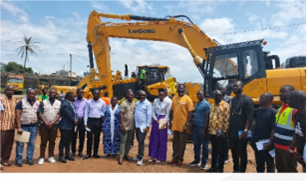The Liberian government, in partnership with the World Bank, has bolstered the Monrovia City Corporation’s (MCC) waste management capabilities with the donation of two vital pieces of heavy machinery: an LD36D Dozer and a 936 Excavator. This contribution, valued at over half a million US dollars, signifies a crucial investment in improving operations at the Wein Town Landfill, the sole sanitary landfill serving the greater Monrovia area. This intervention addresses the landfill’s longstanding operational limitations and aims to mitigate the recurring fire incidents that have plagued the site, posing significant threats to public health and sanitation. The donation falls under the broader umbrella of the Liberia Urban Resilience Project (LURP), a collaborative initiative between the Liberian government and the World Bank designed to enhance urban planning, flood management, and climate resilience in five key Liberian cities.
The Wein Town Landfill, established in 2005, has struggled to cope with the demands of a rapidly growing population in Greater Monrovia, estimated at 1.9 million people. The site has long surpassed its intended capacity, leading to difficulties in waste compaction and spreading, exacerbating the risk of fires and environmental contamination. This donation of heavy machinery is expected to significantly improve the MCC’s ability to manage the large volume of waste generated daily, promoting more efficient and safer landfill operations. This initiative follows a previous donation earlier in the year of fire suppression concentrate, further demonstrating the commitment to addressing the pressing challenges at the landfill.
The handover ceremony, attended by key government officials including the Acting Public Works Minister and the Mayor of Monrovia, highlighted the significance of this donation within the context of Liberia’s national development agenda. Acting Minister Taplah emphasized that the equipment represents not just a material contribution but a commitment to the President’s development vision, particularly focusing on resilience, sanitation, and transformation. She stressed the importance of community participation and responsible waste disposal practices as integral components of sustainable waste management.
Mayor Siafa expressed profound gratitude for the much-needed equipment, underscoring the daily struggles faced by the MCC in managing the landfill. He highlighted the critical role the new machinery will play in enhancing the city’s waste management capabilities and improving the overall sanitation and environmental health of Greater Monrovia. The representative from the Ministry of Finance and Development Planning echoed these sentiments, emphasizing the broader implications of the donation in terms of capacity building and improved service delivery.
The LURP, a six-year, $40 million initiative funded by the World Bank, aims to strengthen urban resilience and improve access to essential services in several Liberian cities. The project focuses on enhancing flood resilience and upgrading community infrastructure, with the donation of the heavy machinery representing a tangible outcome of this commitment. This support reflects a broader strategy to address critical infrastructure gaps and enhance the capacity of local governments to manage essential services, contributing to sustainable urban development.
This targeted intervention at the Wein Town Landfill is expected to have a significant impact on the lives of residents in Greater Monrovia. By improving waste management practices and mitigating health risks associated with improper waste disposal, the project contributes to a cleaner and healthier environment. The successful implementation and sustained operation of this new equipment are crucial for achieving the project’s long-term goals of improved sanitation, enhanced urban resilience, and a higher quality of life for the communities served. The collaborative efforts of the government, the World Bank, and the MCC underscore the importance of partnership in addressing complex urban challenges and promoting sustainable development.


